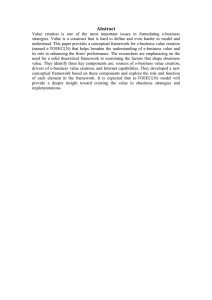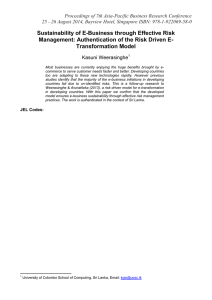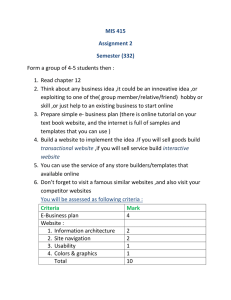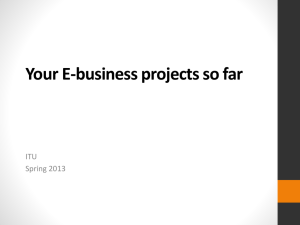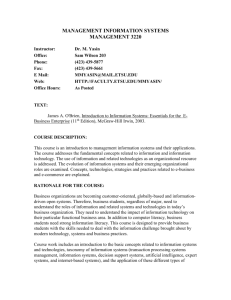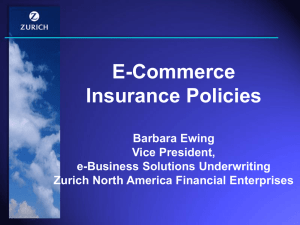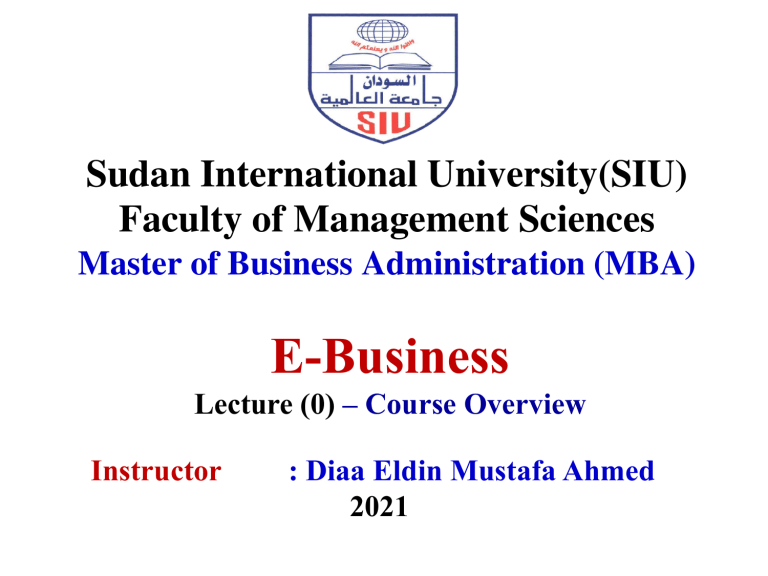
Sudan International University(SIU) Faculty of Management Sciences Master of Business Administration (MBA) E-Business Lecture (0) – Course Overview Instructor : Diaa Eldin Mustafa Ahmed 2021 Introduction In the last decade, the Internet and World Wide Web have changed the way people communicate , conduct business and manage their daily lives. Computer use is increasing in almost every field of endeavor. In an era of steadily rising costs, computing costs have decreased dramatically because of the rapid developments in both hardware and software technology. Advances in hardware and software have led to the explosion of the Internet and World Wide Web. E-business - Lecture (0) Diaa Eldein Mustafa 2 Introduction We have recently entered the Age of Knowledge or Digital Age. The phrases “Knowledge is power” and “content is king” are often used in reference to business conducted on the Internet. Events in the short course of e-business and e-commerce history have demonstrated that successful e-businesses are those that recognize the needs of their target audiences and match those needs with relevant content E-business and e-commerce have increased the speed and ease of business transactions and, as a result, competition is intense . E-business - Lecture (0) Diaa Eldein Mustafa 3 Introduction Businesses must adjust constantly to new technologies, integrate newer and faster systems and meet the needs of people around the world. Inventories are no longer kept in preparation for orders; rather, products are prepared specifically for consumers. Good employees are hard to find and even harder to keep. Competing entities must now collaborate to survive, and must realize that customers do not have far to go to buy from the next available vendor. E-business - Lecture (0) Diaa Eldein Mustafa 4 Introduction As more people begin using the Web, all companies, whether they are currently established online or planning to conduct some of their business transactions online, must consider the impact that Web-enabled business will have on them. Setting up and running an e-business, especially one that processes a large number of transactions, requires technical, marketing and advertising expertise. E-business - Lecture (0) Diaa Eldein Mustafa 5 Introduction Customers want access to products and services on a 24-by-7 basis (24 hours-per-day, 7 days-perweek) and the easiest way to provide that is to move operations online. The terms e-services ,e-business , e-commerce , e-government , are coined due to the advancements on the internet technology and the new innovations on the Information and Communication Technology (ICT). E-business - Lecture (0) Diaa Eldein Mustafa 6 E-Business, EE-Commerce, and EE-Government E-business E-commerce E-governments E-services E-business - Lecture (0) Diaa Eldein Mustafa 7 E-Business, EE-Commerce, and EE-Government E-business: – Electronic business (e-business) can be defined as the use of the internet to network and empower business processes, electronic commerce, organizational communication and collaboration within a company and with its customers, suppliers, and other stakeholders. – E-businesses utilize the internet, intranets, extranets and other networks to support their commercial processes. E-business - Lecture (0) Diaa Eldein Mustafa 8 E-Business, EE-Commerce, and EE-Government E-commerce: – Subset of e-business – Electronic commerce (e-commerce) is the buying and selling, marketing and servicing of products and services via computer networks. – Since e-business includes the process of transacting with suppliers and customers there is an overlap in activities with e-commerce. E-business - Lecture (0) Diaa Eldein Mustafa 9 E-Business, EE-Commerce, and EE-Government – Although the terms ‘e-business’ and ‘e-commerce’ are often used synonymously , the distinction between them lies in the broader range of processes in e-business that incorporates internal transactions within an organization. – These include transactions relating to procurement, logistics, supply chain management, payments, stock control and order tracking. E-business - Lecture (0) Diaa Eldein Mustafa 10 E-Business, EE-Commerce, and EE-Government E-government: – Using Internet technology to deliver information and services to citizens, employees, and businesses – Is the application of Information and Communication Technologies (ICTs) to government functions and procedures with the purpose of increasing efficiency, transparency and citizen participation. E-business - Lecture (0) Diaa Eldein Mustafa 11 E-Business, EE-Commerce, and EE-Government • Generally, the e-Government concept brings four domains: – e-Administration – Improving government processes by using ICTs and government process management. No paperwork, each and every process need to be done via the use of ICT. – e-Government services – Delivering government services electronically to citizens, businesses, and government employees. Example- application for citizenship through the online system. E-business - Lecture (0) Diaa Eldein Mustafa 12 E-Business, EE-Commerce, and EE-Government – e-Democracy – Improving transparency and democratic decision making, as well as citizens’ participation in public decisions. e-Voting is a perfect example here. – e-Governance – It is a development, deployment, and enforcement of the policies, laws, and regulations necessary for developing cooperation, networking and partnerships between government units, citizens and the business. – Citizen will get government services using technology. – Public agencies are the service provider and citizens as well as businesses are the service receiver E-business - Lecture (0) Diaa Eldein Mustafa 13 E-Business, EE-Commerce, and EE-Government E-services – (electronic services) are services which use of Information and Communication Technologies (ICTs). – The three main components of e-services are- service provider, service receiver and the channels of service delivery (i.e., technology). – For example, as concerned to public e-service, public agencies are the service provider and citizens as well as businesses are the service receiver. – Internet is the main channel of e-service delivery while other classic channels (e.g. telephone, call center, public kiosk, mobile phone, television) are also considered. E-business - Lecture (0) Diaa Eldein Mustafa 14 Agenda Aims of the course . Course Contents (outlines). Course Schedule . Learning Outcomes. Seminar Topics , Seminars Guidelines , and Regulations. • Assessment Criterion. • Text Books and Study Resources . • • • • • E-business - Lecture (0) Diaa Eldein Mustafa 15 Aims of the course • Introduction to E-Business through explores what an E-business is and how it is managed. • E-business is an interdisciplinary topic nowadays and encompassing both business and technology (How can merge business with technology ?). • Basic business aspects and applications throughout the business world include commercial business, government, education, and health services. E-business - Lecture (0) Diaa Eldein Mustafa 16 Aims of the course • The major characteristics, opportunities and limitations of this form of business are explored. • Studying various issues and risks that exist in the rapidly changing world of e-business. • Equip current and future managers with some of the knowledge and practical skills to help them navigate their organization towards digital business. E-business - Lecture (0) Diaa Eldein Mustafa 17 Chapter (1) Introduction to E-business & E-Commerce PART (1) - INTRODUCTION Chapter (2) Chapter (3) E-commerce fundamentals E-business infrastructure Chapter (4) E-environment PART (2) - STRATEGY AND APPLICATIONS Chapter (5) E-business strategy Chapter (10) Change management Chapter (6) Supply chain management Chapter (7) Chapter (8-9) E-procurement E-marketing & CRM PART (3) - IMPLEMENTATION Chapter (11) Chapter (12) Analysis and design Digital business service implementation and optimization E-business - Lecture (0) Diaa Eldein Mustafa Chapter (13) Mobile commerce (Mcommerce) 18 Course Schedule Week Topics 1, 2 3, 4 Introduction E-business Fundamentals Topic Details Reference Introduction to e-services (e-business , e-commerce and e-government) E-business Applications E-commerce fundamentals Ch. 1 Capabilities and benefits of e-business Internet Consumers and Market Research Social media, social commerce Models Strategy Architecture Ch. 2 Environment Infrastructure Supply chain management. E-business - Lecture (0) Diaa Eldein Mustafa 19 Course Schedule Week 5 6 7 Topics Topic Details Reference E-business infrastructure components E-business Internet Technology infrastructure Web Technology Social and legal factors Environmental and green issues related to Internet usage E-environment Economic and competitive factors Political factors E-government What is e-business strategy? Strategic analysis E-business Strategic objectives strategy Strategy definition Strategy implementation E-business - Lecture (0) Diaa Eldein Mustafa 20 Course Schedule Week 8 9 10 Topics Topic Details Reference Problems of supply chain management Supply chain Focus on the value chain Options for restructuring the supply management chain Supply chain management implementation What is e-procurement? E-procurement Drivers of e-procurement Estimating e-procurement cost Implementing e-procurement What is e-marketing? E-marketing E-marketing planning Strategy and Tactics Actions and Control E-business - Lecture (0) Diaa Eldein Mustafa 21 Course Schedule Week Topics 11 Customer Relationship 12 Change Management 13 14 Presentations Presentations Topic Details Conversion marketing Customer retention management e-commerce service quality Technology solutions for CRM Different types of change in business Different types of change in business Planning change Human resource requirements Revising organizational structures Knowledge management Risk management E-business - Lecture (0) Diaa Eldein Mustafa Reference 22 Learning Outcomes • After completing this course the students should be able to: – Define and understand the concepts of e-business including their models , infrastructure , environments , and strategy . – Aware with the supply chain management and the problems facing the increasing of the value chain ,and the different Options for restructuring the supply chain. – Define and implement the concepts of E-procurement and E-marketing – Focus on Customer Relationship and Change E-business - Lecture (0) Diaa Eldein Mustafa Management. 23 Seminar Topics • ICT impact on digital economy and e-business. • Security models for e-government applications. • Social media marketing. • Security threats in e-commerce. • Careers in E-business • Security, Trust & Protection • E-Collaboration . • Comparing the benefits of ecommerce in different fields. E-business - Lecture (0) Diaa Eldein Mustafa 24 Seminar Topics • Using Business Process Reengineering to integrate e-commerce into a company. • Benefits of using e-commerce to both buyers and sellers. • Regulations and standards that guide the implementation of e-commerce. • Challenges to e-services in the Developing World. • Effect of bitcoin on the future of e-business. E-business - Lecture (0) Diaa Eldein Mustafa 25 Seminar Topics • E-Business models for financial services and internet banks. • Outsourcing and E-Business Technologies • Sustainable E-Business. • Virtual Organization . • Social media-based e-business models. E-business - Lecture (0) Diaa Eldein Mustafa 26 Seminars Regulations • • • • Each group composed of 2 students at max. 15 minutes only for presentation . 5 minutes only for discussion . Assessment: 5 marks for contents 3 marks for finishing in time. 5 marks for preparing the (slides) in suitable way. 4 marks for reference and citation ,conclusion. 8 marks for each presenter including (Knowledge, voice , language ). – 5 marks Bonus for the most excellent work . – – – – – E-business - Lecture (0) Diaa Eldein Mustafa 27 Assessment Criterion • • • • Assignments (will be 2) Quiz (will be 1) Seminar Final Exam • Course Credit hours • Examination hours E-business - Lecture (0) Diaa Eldein Mustafa = 10% = 5% = 25 % = 60% =3 =3 28 Text book and study Materials Introduction to E-business , Management and strategy 4th edition ,2016 Colin Combe Digital Business and E-commerce Management Strategy, Implementation and practice 6th edition , 2015 Dave Chaffey E-business - Lecture (0) Diaa Eldein Mustafa 29 Thank You End Questions ? E-business - Lecture (0) Diaa Eldein Mustafa 30
